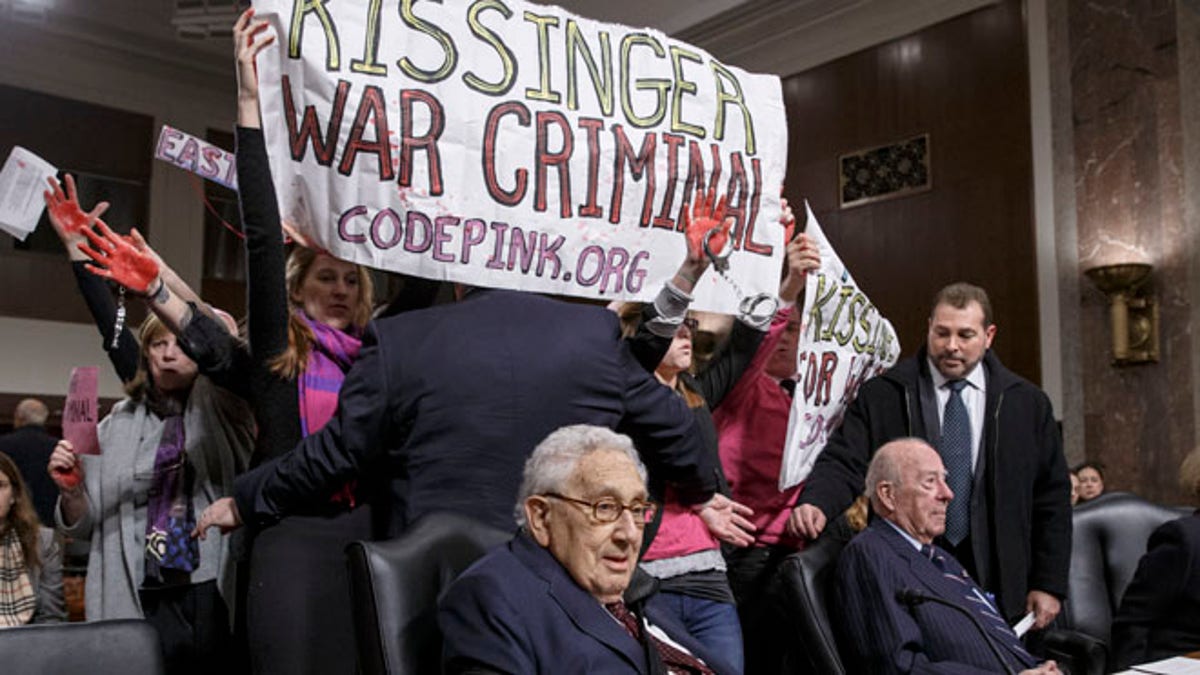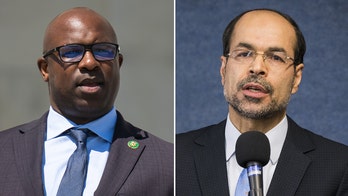
FILE: Jan. 29, 2015: Code Pink protesters at the Senate Armed Services hearing attended by former Secretary of State Henry A. Kissinger, Capitol Hill, Washington, D.C. (AP)
Perhaps it all started in 1517 in Wittenberg, Germany.
That’s when Martin Luther tacked his 95 theses to the church door. Or when the Sons of Liberty poured chests of tea into the Boston Harbor. Perchance when the French stormed the Bastille.
Maybe it began when Henry David Thoreau refused to cough up a poll tax for fear the government would use it to bankroll the Mexican-American War. Perhaps when Martin Luther King and Rep. John Lewis, D-Ga., challenged the Alabama State Troopers on Bloody Sunday. Try various collegiate sit-ins over Vietnam. Conceivably is started when Desiree Fairooz attempted to smear her blood-colored hands all over Secretary of State Condoleezza Rice at a 2007 House hearing about the Iraq war. Feasible to assert it may have been when Occupy Wall Street started camping out in city parks.
Or maybe, just maybe, it all started when a band of Code Pink protesters showed up at a Senate Armed Services Committee hearing Thursday morning that featured former Secretary of State Henry Kissinger.
The 91-year-old Kissinger entered the room, using a cane, his right arm wrapped in a sling after suffering a broken shoulder. The Nixon-era diplomat approached the witness table for a discussion on U.S. foreign policy with fellow former Secretaries of State George Shultz and Madeleine Albright. And that’s when Code Pink demonstrators began chanting “Arrest Henry Kissinger for War Crimes!” They slid behind Kissinger, unfurling banners and signs about East Timor. Some dangled handcuffs over Kissinger’s head.
The spectacle galled Armed Services Committee Chairman John McCain, R-Ariz. He recessed the panel and asked the U.S. Capitol Police (USCP) to “restore order here.”
One officer tried to intervene and immediately got on his radio to summon backup. Another officer who had been assigned to the hearing was out on break. The demonstrators hectored Kissinger about Chile and Vietnam. The 94-year-old Shultz wheeled around to face the protesters. Shultz cupped his hands around his mouth like a megaphone to shout over the din.
“I salute Henry Kissinger for his contributions to peace and security!” bellowed Shultz.
With only one outmanned officer in the hearing room, McCain apologized to Kissinger, saying he had “never seen anything as disgraceful, outrageous and despicable.”
One protester returned to his seat, yet continued to bluster at the Arizona Republican from the rear of the room.
“I’m going to have you arrested if you can’t get the Capitol Police in here immediately,” snarled McCain.
The demonstrator barked a parting shot at McCain as the officer coaxed the man to leave.
“Get out of here, you low-life scum,” growled McCain, drawing applause from some in the audience.
McCain later expressed his displeasure about how USCP handled the scene to Senate Rules Committee Chairman Roy Blunt, R-Mo., and the USCP. McCain declared that he expected “those responsible will be held fully accountable for their actions.”
It’s rare for a lawmaker to publicly call out the USCP in that fashion.
In 2013, many lawmakers weren’t pleased with how the USCP and Secret Service dealt with a wild car chase that ended in the deadly shooting of Miriam Carey. Some lawmakers had questions a few weeks ago about why the USCP and other authorities didn’t arrest the driver of a car involved in a car chase near the foot of Capitol Hill while President Obama delivered his State of the Union address.
McCain’s remarks were reminiscent of then-Sen. Wayne Allard, R-Colo., in 2007 who initially said he was “disgusted” with how the USCP handled a graffiti case. Protesters managed to spray-paint the west front terrace level of the Capitol during a demonstration.
After McCain raised his ire, USCP spokeswoman Lt. Kimberly Schneider indicated that the force takes “very seriously our mission to protect the Congress and its legislative processes, while balancing safety and security, and the First Amendment rights of people to peaceably assemble.”
But Schneider added that the response to the protest “clearly did not demonstrate that mission nor did our actions meet the standards expected of the USCP.”
And that’s the challenge each day for the USCP. In other words, Congress must be free from disruption to conduct the business of the people. To some degree, Congress needs to operate above the fray to gather facts, information and weigh how to make critical decisions. But by the same token, if people can’t demonstrate at the U.S. Capitol, where can they protest? Congress is the essence of where people come to air their grievances. Sometimes people meet quietly in an office with a lawmaker or staff. Other times, they shout from the top of their lungs in front of a phalanx of television cameras on the Capitol plaza.
At what point does an expression of dissent interfere with Congress? Moreover, the concepts of protests and civil disobedience are ingrained in the fabric of the United States from the start. The attitude still resonates today, be it over taxation without representation, civil rights, war or health care reform.
In fact, the invective directed at Kissinger is an echo of Vietnam -- one of the most-discordant times in American history. Dissent and protest in Washington were hallmarks of that period. Kissinger won the Nobel Peace Prize for helping engineer the Paris Peace accords to end fighting between North and South Vietnam. It was a deal that called for the return of U.S. prisoners, including McCain. The North Vietnamese captured McCain in October, 1967 after shooting down his plane. He was held for five-and-a-half years.
Even then, Kissinger’s critics railed at him for convincing President Nixon to bomb Cambodia and Laos. Later, under the Ford administration, Kissinger detractors assert the U.S. looked the other way when U.S. proxies in Indonesia -- using U.S.-manufactured arms - massacred innocent bystanders in East Timor.
In some respects, Thursday’s hearing was a time machine. The same injustices that brought protesters to Capitol Hill about Kissinger 40 years ago were simply reverberating off the same walls when he showed up now. The tensions were the same. The conflicts were the same. And the balancing act for USCP to preserve the right to protest yet not let it interfere with the business of government is the same.
In an interview with Alan Colmes on Fox News Radio, Medea Benjamin of Operation Code Pink said she didn’t think “there was any physical threat (to Kissinger) at all because we’re peace activists. We know there would be an assault charge if we actually touched (Kissinger).”
And there’s an interesting point. USCP deals with Code Pink all the time. While Code Pink might be raucous and verbose, they know where the line is for the USCP. In fact, demonstrators sometimes talk to authorities beforehand to tell them what they plan to do. Sometimes they just want to make a scene and then withdraw. Other times, they intend to be arrested.
It’s almost as though there’s choreography on Capitol Hill when it comes to interactions between the USCP and groups like Code Pink. The demonstrators know what to expect from the police, and the police know when it’s time to move in. In one recent instance, authorities told a protest group that members would be arrested if they conducted a protest on the congressional plaza in front of the Capitol. As a result, the demonstrators moved their protest elsewhere on the congressional campus.
But there is a grey area here. A decision to arrest or remove demonstrators is up to the discretion of the officers on scene. And sometimes, it’s up to lawmakers chairing a given hearing. Multiple sources familiar with congressional law enforcement tell Fox that USCP probably should have arrested some of Thursday’s protesters.
“Code Pink’s typical protest tactics include interrupting congressional hearings with chanting and sign-holding, which while disruptive and improper, do not represent a threat to witnesses,” said McCain. “What happened today was far different.”
The lone officer in the room on Thursday promptly called for back-up. In fact the USCP have officers ready to respond to a variety of situations that may unfold throughout the day. Sometimes committee chairmen or their aides tell USCP in advance of events that they think may require a police presence. The USCP also does its homework behind the scenes to anticipate situations where things could get volatile. Some committee chairmen even occasionally ask police not be present at certain hearings out of fear that could escalate tensions.
In 2007, Condoleezza Rice appeared before the House Foreign Affairs Committee. Desiree Fairooz confronted the secretary, holding up her hands dipped in red ink.
“The blood of millions of Iraqis is on your hands!” shouted Ali-Fairooz. USCP and diplomatic security agents immediately wrestled Ali-Fairooz away.
“Out!” thundered the late-committee chairman, Rep. Tom Lantos, D-Calif., Lantos also asked the cops to hustle away a few other Code Pink demonstrators.
In 2012, USCP arrested filmmaker Josh Fox when he attempted to shoot a House Science subcommittee hearing on fracking. Fox made the Oscar-nominated documentary “Gasland.” Fox lacked appropriate congressional press credentials when he tried to set up his camera in the back of the hearing room. When Fox refused to shut off his camera, subcommittee chairman Andy Harris, R-Md., ordered police to arrest the documentarian.
“I cannot recall a chair of any committee or subcommittee having ever ordered the removal of a person who was filming a committee proceeding and not being disruptive, whether or not that person was accredited,” argued Rep. Jerry Nadler, D-N.Y.
“This is blatant censorship,” said then-Rep. Maurice Hinchey, a fellow New York Democrat
House rules indicate that hearings and meetings “shall be in strict conformity with and observance of the acceptable standards of dignity, propriety, courtesy and decorum traditionally observed by the House in its operations.”
Senate rules state “when the chair finds it necessary to maintain order, he shall have the power to clear the room” and that it “shall be the duty of the Chair to enforce order on his own initiative.”
In other words, lawmakers have a lot of control over these hearings. But USCP may intervene if they feel it’s appropriate.
This is the natural tension of an open society. Especially in a place where protest and civil disobedience is the American way.
In 1848, Henry David Thoreau spent a night in jail for speaking out about U.S. involvement in a conflict he didn’t agree with. The same reasons why the Code Pink came to protest Kissinger about decisions made four decades ago.
“Disobedience is the true foundation of liberty,” Thoreau wrote.




